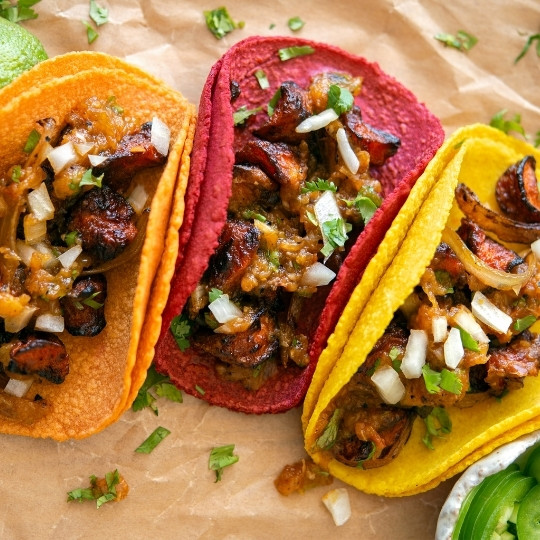Explore the evolving plant-based food industry and discover how the plant-forward movement is driving innovation with whole foods, natural food colors, and sustainability. Learn tips for food manufacturers to embrace this shift and meet consumer demands for transparency and authenticity.
Embracing the Plant-Forward Movement
The plant-based food industry is at a pivotal moment, fueled by growing consumer interest in reducing meat consumption, especially among flexitarians who primarily eat plant-based foods but occasionally include meat and dairy. However, despite its growth potential, it also confronts significant challenges like brand consolidation, sluggish sales, and unmet consumer expectations. But with the global market projected to reach $112 billion by 2030 and a compound annual growth rate of 25.7%1, the conversation is evolving.
In response, one trend that is emerging is a more inclusive “plant-forward” approach—one that celebrates whole plant-derived foods like recognizable fruits, vegetables, and grains, and prioritizes transparency in how these foods are produced. This movement caters to flexitarians who not only want to reduce their meat consumption but also prefer consuming whole, natural foods. By embracing this approach, brands can better meet evolving consumer expectations, positioning themselves to thrive and lead in a competitive marketplace.
Plant-Forward vs. Plant-Based: Understanding the Shift
While “plant-based” traditionally refers to diets excluding all animal products, there’s a growing trend toward “plant-forward” or “plant-focused” eating. These terms resonate with flexitarians—those reducing but not fully eliminating meat—who seek a more balanced approach that emphasizes plants.
What’s Driving the Plant-Forward Movement?
Health and sustainability are key drivers. Consumers increasingly favor whole, minimally processed foods for their perceived health benefits and clean labels. Additionally, plant-forward eating aligns with environmental concerns, offering a lower ecological footprint. Transparency also plays a crucial role, as informed consumers demand authenticity and clarity about where their food comes from and how it’s made.
Innovative Approaches in the Plant-Based Food Industry
The EXBERRY® culinary team pushes the boundaries of plant-forward innovation, opening new doors for food manufacturers by creating concepts that highlight whole foods as the star while introducing exciting new flavor experiences.
Here are 3 Tips to Seize the Vast Opportunities:
- Make the Plant the Hero: Elevate whole plant-derived ingredients to the center stage, highlighting their natural flavors, textures, and nutritional benefits, creating products that celebrate the essence of what plants can offer.
- Add Vibrant Colors to Reflect the Diversity of Nature: Utilize the full spectrum of natural colors derived from fruits, vegetables, and plants to create visually stunning products that not only appeal to the eye but also emphasize the richness and diversity of plant-based options.
- Convey a Sustainability Story: Leverage sustainability initiatives, such as incorporating upcycled plant ingredients, to connect with eco-conscious consumers. This approach not only reduces waste but also adds value to products by telling a story of responsible sourcing and production.
Let’s explore some examples from our culinary team of the pioneering new ways to make plants the star of the plate while delivering bold, exciting colors and flavors.
One standout concept is the Hot Cauliflower Sandwich, a plant-based take on Nashville’s hot chicken sandwich, where cauliflower is transformed with a buttermilk and hot sauce brine and a two-step cook process resulting in a meaty texture with the signature crispy, spicy coating.

Another innovation is Parsnip Bacon, where parsnips are brushed with cold-smoked vegan butter, slow-cooked, and roasted to achieve a chewy, caramelized texture that rivals traditional bacon, enhanced with rich EXBERRY® shades.


For a plant-forward twist on a classic, the team created Carrots Al Pastor, featuring carrots marinated in spices and roasted to mimic the texture of al pastor, served in vibrant tortillas colored with EXBERRY® shades.

Finally, Hot-Honey Carrot Crackers exemplify upcycled innovation by utilizing carrot pulp leftover from juicing. These crackers, seasoned with hot-honey seasoning featuring gochugaru, offer a spicy-sweet crunch while addressing food waste.

A Vibrant New Story to Tell
Plant-based colors, like those from EXBERRY®, are essential to the plant-forward movement. They enhance the visual appeal of products while supporting the growing consumer demand for transparency and sustainability.
Plant-forward eating isn’t just a trend; it’s a significant shift in consumer thinking. With nearly half of all restaurants now offering plant-based options, up from 30% in 20122, this movement presents both a challenge and an opportunity for the food and beverage industry. By embracing plant-forward innovation and leveraging natural ingredients, brands can meet the demand for healthier, more sustainable products.
As the market evolves, the role of natural colors from EXBERRY® will become even more vital. Our clean label solutions not only enhance product aesthetics but also align with the demand for transparency and authenticity. The future of food is vibrant, sustainable, and plant-forward—are you ready to embrace it?
Ready to innovate in the plant-based food industry? Contact us today to discover how EXBERRY® can help you create vibrant, sustainable, plant-forward products that consumers will love.
References:
